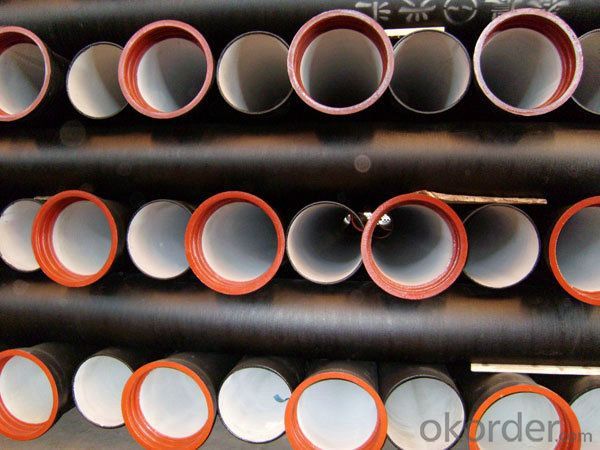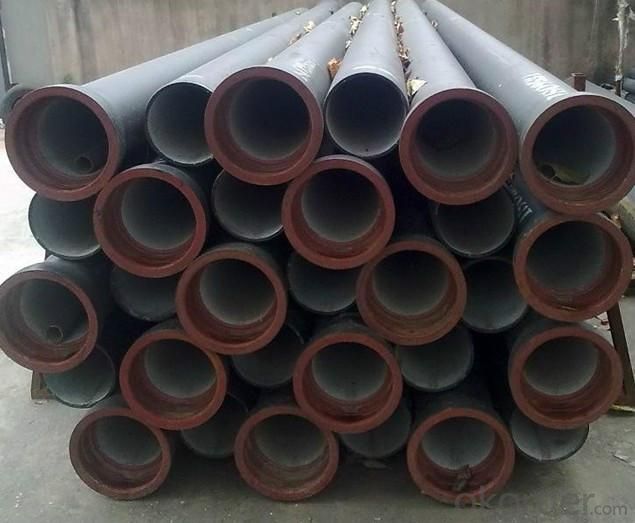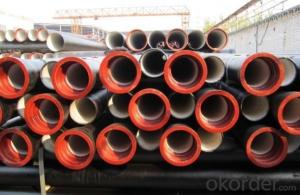Ductile Iron Pipe of China DN300-DN900 EN598 C40 On Sale
- Loading Port:
- China main port
- Payment Terms:
- TT or LC
- Min Order Qty:
- 20 m.t.
- Supply Capability:
- 100000 m.t./month
OKorder Service Pledge
OKorder Financial Service
You Might Also Like
1,Ductile Iron Pipe Description :
1) Pipes confirm to ISO2531,K9 class,T type joint,6m long,with inside cements lining conform to ISO4179, outside Zinc spraying(130g/m2) and bitumen coating(70μm) conform to ISO8179.
2) Pipe ends: Spigot and socket ends, with 100% SBR rubber gaskets accoding to ISO4633
3) we can do third party inspection according to customer's request.
4) Our products have been sold to many international market,such as Middle East and South East Asia and Africa.
2,Main Features of the Ductile Iron Pipe:
·High yield strength
·High tensile Strength
·High corrosion resistance
·Pressure Resistence
·Anti-corrosion
·Installation is convenient
·Satisfy the highest hygienic standards
3,Ductile Iron Pipe Images:


4. Ductile Iron Pipe Specification
Quick Details
Place of Origin: China (Mainland)
Model Number: DN80-1600 Length: 6M/5.7M/NEGOTIATED Standard: ISO2531 / EN545
Application: Potable/Sewage Water
Diameter: DN80-1600
Shape: Round
Hardness: 230 Pipe
Wall Thickness: standerd
Pull Strength: 420
Yield (≥ MPa): 300
Material: Ductile Iron water ductile iron pipe: SO2531 / EN545 DI pipe
Packaging & Delivery
Delivery Detail: 30-45 days
ductile iron pipe:
1. DN80-DN1600mm (T-Type, Class K9)
2.effective length 6m/pc
3.comply with ISO2531/EN545/EN598
5.FAQ:
We have organized several common questions for our clients,may help you sincerely:
1.Q: Why would you choose ductile iron pipe rather than other pipe materials?
A:The reasons are obvious for that not only ductile iron pipe possesses the inherent strength and flexibility of ductile iron, combined with proven corrosion protection systems, but also the cost savings can be achieved from design to installation and commissioning.
2.Q:Why can you guarantee the inner of pipes can’t be corroded?
A: High alumina cement mortar lining and sulphate-resistant cement mortar lining. These two special linings are applicable to inner anti-corrosion for sewage pipes, improving resistance to erosion of the sewage components.
- Q:Can ductile iron pipes be used for railway bridges?
- Yes, ductile iron pipes can be used for railway bridges. They are commonly used in bridge construction due to their high strength, durability, and resistance to corrosion. Additionally, ductile iron pipes can withstand heavy loads and provide excellent structural support, making them suitable for railway bridge applications.
- Q:Are ductile iron pipes suitable for trenchless installation methods?
- Yes, ductile iron pipes are suitable for trenchless installation methods. Ductile iron pipes are known for their strength, durability, and flexibility, making them ideal for trenchless installation methods such as horizontal directional drilling (HDD) and pipe bursting. HDD involves drilling a small pilot hole underground and then pulling the ductile iron pipe through the hole, without the need for extensive trenching. Ductile iron pipes can withstand the pulling forces exerted during this process and can be easily guided through the underground path. Pipe bursting is another trenchless method where an existing pipe is replaced by breaking it apart while simultaneously pulling a new ductile iron pipe into place. The strength and flexibility of ductile iron pipes allow them to withstand the force required to burst the existing pipe and replace it with minimal disruption to the surrounding area. In both these trenchless installation methods, ductile iron pipes offer several advantages. They have a high resistance to corrosion and can withstand high-pressure applications, making them suitable for a wide range of underground environments. Ductile iron pipes also have a long service life, reducing the need for frequent replacement and maintenance. Overall, ductile iron pipes are a reliable and suitable choice for trenchless installation methods, providing efficient and cost-effective solutions for underground pipe installations.
- Q:Can ductile iron pipes be used in dam or reservoir projects?
- Ductile iron pipes are highly suitable for dam or reservoir projects. Their strength, durability, and resistance to corrosion are well-known, making them a preferred choice for a range of applications, such as water distribution and transmission systems. In projects involving dams or reservoirs, where the pipes must endure high pressure and transport large volumes of water, ductile iron pipes are often the top choice. Their exceptional mechanical properties, including impressive tensile strength and impact resistance, guarantee their ability to handle the load and offer a dependable and long-lasting solution. Moreover, ductile iron pipes can easily adapt to various installation methods, including trenchless techniques, making them a versatile option for dam or reservoir projects.
- Q:Can ductile iron pipe be used for pressure sewer systems?
- Ductile iron pipe is indeed suitable for pressure sewer systems. Renowned for its strength, durability, and corrosion resistance, ductile iron pipe finds application in various fields, including pressure sewer systems. It effortlessly withstands high-pressure environments, serving as a dependable conduit for pressurized wastewater transportation. Furthermore, its exceptional joint integrity ensures leak-free connections and mitigates the possibility of sewer system breakdowns. Consequently, ductile iron pipe is widely employed in pressure sewer systems due to its unwavering structural integrity and extended lifespan.
- Q:How are ductile iron pipes restrained against axial thrust forces?
- Ductile iron pipes are restrained against axial thrust forces through a combination of mechanical restraints and soil resistance. One common method of restraining axial thrust forces is by using thrust blocks. Thrust blocks are concrete structures that are built at bends, tees, and other locations where changes in direction occur in the pipeline. These blocks are designed to resist the axial forces and prevent the pipes from shifting or moving due to the pressure exerted by the flowing fluid. Additionally, mechanical restraints such as pipe restraints, thrust collars, and anchor blocks are used to provide further support and prevent axial movement. Pipe restraints are devices that are installed around the pipe and connected to adjacent structures, such as walls or concrete collars, to prevent movement. Thrust collars are also used to absorb and distribute the thrust forces generated by the flowing fluid. These collars are typically made of ductile iron or steel and are secured around the pipe to resist axial movement. Furthermore, soil resistance plays a significant role in restraining axial thrust forces. The weight of the soil surrounding the pipe creates frictional resistance, which helps counteract the axial forces. Proper trench backfilling, compaction, and adequate embedment of the pipe in the soil are essential to ensure effective soil resistance. In summary, ductile iron pipes are restrained against axial thrust forces through a combination of mechanical restraints such as thrust blocks, pipe restraints, and thrust collars, as well as soil resistance provided by proper trench backfilling and compaction. This comprehensive approach ensures that the pipes remain securely in place and can withstand the axial forces generated by the fluid flowing through them.
- Q:How do ductile iron pipes handle pressure surges in pumping stations?
- Ductile iron pipes are specifically designed to handle pressure surges in pumping stations effectively. The inherent strength and flexibility of ductile iron make it well-suited to withstand the sudden increase in pressure that can occur during pump start-up or shutdown. One of the key features of ductile iron pipes is their ability to absorb and dissipate energy. When a pressure surge occurs, the ductile iron pipes have the capacity to absorb the excess pressure and distribute it evenly throughout the pipe network. This helps to minimize the impact of the surge and prevent any potential damage to the pipes or the pumping station. Additionally, ductile iron pipes have a high resistance to impact and stress, which further enhances their ability to handle pressure surges. The pipes are manufactured using a unique process that imparts strength and durability, allowing them to withstand the forces exerted during pressure fluctuations without any significant deformation or failure. Furthermore, ductile iron pipes have a smooth internal surface, which reduces friction and turbulence within the pipe network. This smooth flow characteristic helps to mitigate the effects of pressure surges by allowing the water to move efficiently without creating additional stress on the pipes. In summary, ductile iron pipes are specifically engineered to handle pressure surges in pumping stations by absorbing and dissipating the excess pressure, withstanding the impact and stress, and promoting smooth flow. Their robustness and reliability make them an ideal choice for applications where pressure fluctuations are common, ensuring the longevity and efficiency of the pumping infrastructure.
- Q:Do ductile iron pipes have inner enamel?
- Internal enamel ductile iron pipe is yes, but now there is almost no market (except for special process requirements), in the civil construction market, new materials, new technologies, new technologies can be replaced, there are many.
- Q:How do ductile iron pipes handle extreme temperatures?
- Ductile iron pipes, known also as cast iron pipes, possess the ability to effectively handle extreme temperatures. The material composition of ductile iron enables it to endure both high and low temperatures without experiencing significant damage or degradation. When exposed to high temperatures, ductile iron pipes demonstrate exceptional thermal resistance, rendering them suitable for applications involving the transportation of hot liquids or gases. The high melting point of ductile iron, ranging from 2060°C to 2200°C, guarantees that the pipes can withstand extreme heat without melting or distorting. Consequently, these pipes are ideal for utilization in industries such as oil and gas, steam distribution, and high-temperature water supply systems. Likewise, ductile iron pipes exhibit satisfactory performance in low-temperature environments. They possess a low coefficient of thermal expansion, thereby enabling them to endure the expansion and contraction that occurs during temperature fluctuations without cracking or fracturing. This quality makes them appropriate for use in cold climates or in applications involving the transportation of chilled liquids or gases. Furthermore, ductile iron pipes possess excellent thermal conductivity, allowing them to efficiently dissipate heat. This characteristic proves particularly significant in high-temperature applications where effective heat transfer is vital to prevent damage to the pipes or the materials being transported. In conclusion, ductile iron pipes effectively handle extreme temperatures due to their high melting point, low coefficient of thermal expansion, and exceptional thermal conductivity. These attributes establish them as a dependable choice for various applications involving extreme temperature conditions.
- Q:How do ductile iron pipes perform in high-velocity water flow conditions?
- Ductile iron pipes perform exceptionally well in high-velocity water flow conditions. Due to their unique composition and manufacturing process, ductile iron pipes exhibit superior strength and durability, making them highly resistant to the forces generated by high-velocity water flow. These pipes are specifically designed to withstand significant hydraulic pressure and turbulent conditions. Their inherent ductility allows them to absorb the energy of the flowing water and effectively dissipate any potential stress or impact that may occur. Additionally, the smooth internal surface of ductile iron pipes minimizes frictional losses, enabling efficient water flow even at high velocities. This characteristic is crucial in maintaining the required water pressure and flow rates in applications such as water distribution systems, sewage networks, and industrial processes. Moreover, the corrosion resistance of ductile iron pipes further enhances their performance in high-velocity water flow conditions. These pipes are typically lined with cement mortar or polyethylene, which provides an additional layer of protection against the corrosive effects of fast-flowing water. Overall, ductile iron pipes are well-suited for high-velocity water flow conditions, offering exceptional strength, durability, and hydraulic efficiency. Their ability to withstand the challenges posed by fast-flowing water makes them a reliable choice for a wide range of applications where high water velocity is a concern.
- Q:Can ductile iron pipe be used for irrigation pumping stations?
- Yes, ductile iron pipe can be used for irrigation pumping stations. Ductile iron pipe is commonly used in various applications, including irrigation systems, due to its durability and strength. It has high tensile strength and can withstand high pressure and heavy loads, making it suitable for irrigation pumping stations. Additionally, ductile iron pipe is resistant to corrosion, which is beneficial in irrigation systems where water is present. It is also easy to install and maintain, making it a cost-effective choice for irrigation projects.
1. Manufacturer Overview |
|
|---|---|
| Location | |
| Year Established | |
| Annual Output Value | |
| Main Markets | |
| Company Certifications | |
2. Manufacturer Certificates |
|
|---|---|
| a) Certification Name | |
| Range | |
| Reference | |
| Validity Period | |
3. Manufacturer Capability |
|
|---|---|
| a)Trade Capacity | |
| Nearest Port | |
| Export Percentage | |
| No.of Employees in Trade Department | |
| Language Spoken: | |
| b)Factory Information | |
| Factory Size: | |
| No. of Production Lines | |
| Contract Manufacturing | |
| Product Price Range | |
Send your message to us
Ductile Iron Pipe of China DN300-DN900 EN598 C40 On Sale
- Loading Port:
- China main port
- Payment Terms:
- TT or LC
- Min Order Qty:
- 20 m.t.
- Supply Capability:
- 100000 m.t./month
OKorder Service Pledge
OKorder Financial Service
Similar products
New products
Hot products
Hot Searches
Related keywords

























